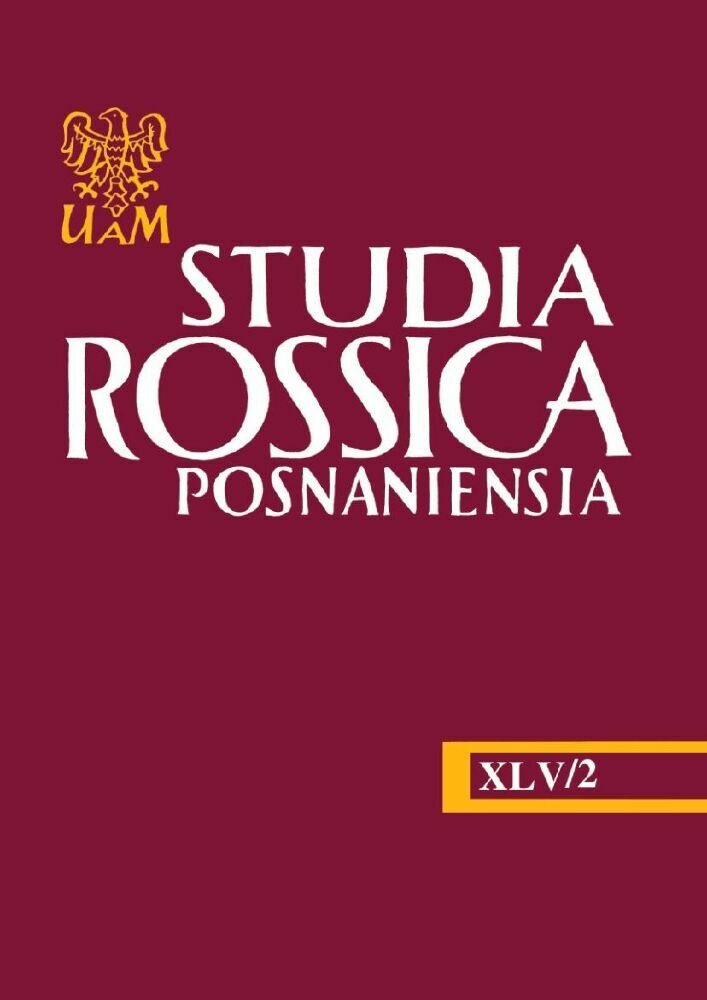Abstrakt
The aim of this paper is to analyze an increasingly dangerous phenomenon in modern times – the Internet addiction – in the context of contemporary Russian literature. It seems that in this light, the work of Viktor Pelevin can serve as a perfect example of a literary voice in the discussion about the condition of the modern world. The present paper uses the findings of modern technology experts (e.g. Clifford Stoll), philosophers, and sociologists (e.g. Jean Baudrillard, Kazimierz Krzysztofek). In Viktor Pelevin’s novel entitled Love for Three Zuckerbrins (Любовь к трeм цукербринам, 2014) the author continues his analysis of the problem, already marked in The Helmet of Horror (Шлем ужаса: Креатифф о Тесее и Минотавре, 2005), centered on the impact of the development of the latest technologies on human beings. While in the author’s earlier works this issue remained in the sphere of predictions and guesses, here it is unequivocally resolved to the detriment of the human individual. By touching upon the question of popular games for people, Pelevin shows their real role – playing with people. In this context the abovementioned attraction to simple entertainment has irreversible effects – a win in an Internet game means a failure in real life. While advocating unequivocally on the side of the opponents of the adulation for cyberspace, Pelevin points out that a complete unification with it will lead to the end of humanity.
Bibliografia
Baudrillard, Jean. Symulacja i symulakry. Przeł. Sławomir Królak. Warszawa, Sic!, 2005.
Baudrillard, Jean. „Świat wideo i podmiot fraktalny”. Po kinie?... Audiowizualność w epoce prze-kaźników elektronicznych. Wyb., przeł. i opr. Andrzej Gwóźdź. Kraków, Universitas, 1994, s. 247–258.
Czauderna, Piotr. Technologia nas ogłupia? Nasz umysł się zmienia. Web. 01.08.2019. https://nate-mat.pl/3531,technologia-nas-oglupia-nasz-umysl-sie-zmienia.
Dubakov, Leonid. Viktor Pelevin. Lûbovʹ k trëm cukerbrinam. Web. 01.08.2019.https://www.proza.ru/2015/05/19/664.
Dygul, Jolanta. Metateatralność w dramaturgii Carla Goldoniego. Warszawa, Wydawnictwa Uniwersytetu Warszawskiego, 2012.
Flusser, Vilém. „Społeczeństwo alfanumeryczne”. Przeł. Andrzej Kopacki. Lettre Internationale1993/94, s. 45–50.
Krzysztofek, Kazimierz. Internet: Edukacja – Kultura – Ekskluzja społeczna. Web. 03.08.2019. https://www.nck.pl/upload/archiwum_kw_files/artykuly/2._kazimierz_krzysztofek_-_inter-net_-_edukacja_-_kultura_-_ekskluzja_spoleczna.pdf.
Martin, Paul. Seks, narkotyki i czekolada. Przeł. Anna Dzierzgowska. Warszawa, Muza SA, 2010.Melʹnikov, Evgenij. Kniga: „Lûbovʹ k trem cukerbrinam”.
Viktor Pelevin. Novyj roman glavnogo mistifikatora sovremennoj literatury. Web 12.07.2019. http://newslab.ru/article/610147.
Pelevin, Viktor. Lûbovʹ k trem cukerbrinam. Moskva, Èksmo, 2014.Pelevin, Viktor. Šlem užasa: Kreatiff o Tesee i Minotavre. Web 12.07.2019. http://loveread.ec/view_global.php?id=2944.
Ritzer, George. Magiczny świat konsumpcji. Przeł. Ludwik Stawowy. Warszawa, Muza SA, 2012.
Štejner, Arsenij. Mistik uglevodorodnoj epohi. Novyj roman Viktora Pelevina – o našestvii krem-nevoj civilizacii, cene podpolʹnoj mudrosti i zlyh pticah s rogatkoj. Web. 03.08.2019. https://lenta.ru/articles/2014/09/09/pelevintxt/.
Stoll, Clifford. Krzemowe remedium. Garść rozważań na temat infostrady. Przeł. Tomasz Hornowski. Poznań, Dom Wydawniczy Rebis, 2000.
Winiecka, Elżbieta. „Twórca w dobie Internetu. Na przykładach polskiej e-literatury”. Porównania, 2 (23), 2018, s. 13–33.
Wojtczak, Dariusz. Siódmy krąg piekła. Antyutopia w literaturze i filmie. Poznań, Rebis, 1994.
Zawojski, Piotr. „Monitory między nami. O byciu razem i osobno w cyberprzestrzeni”. Wiek ekranów. Przestrzenie kultury widzenia. Red. Andrzej Gwóźdź, Piotr Zawojski. Kraków, Rabid, 2002, s. 423–431.
Licencja
PRACE PUBLIKOWANE W CZASOPIŚMIE DOSTĘPNE SĄ NA LICENCJI CREATIVE COMMONS:
Uznanie autorstwa-Użycie niekomercyjne-Na tych samych warunkach 4.0 Międzynarodowe.
Autorzy tekstów przyjętych do publikacji w czasopiśmie „Studia Rossica Posnaniensia” są zobowiązani do wypełnienia, podpisania i odesłania na adres redakcji umowy o udzielenie nieodpłatnej licencji do utworów, z zobowiązaniem do udzielania sublicencji Creative Commons.
Zgodnie z umową, autorzy tekstów opublikowanych w czasopiśmie “Studia Rossica Posnaniensia” udzielają Uniwersytetowi im. Adama Mickiewicza w Poznaniu niewyłącznej i nieodpłatnej licencji oraz zezwalają na użycie sublicencji Attribution-NonCommercial-ShareAlike 4.0 International (CC BY-NC-SA 4.0).
Autorzy zachowują prawa do dalszego, swobodnego rozporządzania utworem.
Autorzy, którzy wykorzystują w swoim tekście cudze utwory (np. ilustracje, fotografie) proszeni są o dostarczenie do redakcji czasopisma zgody na publikację.
Użytkownicy internetu uprawnieni są do korzystania z utworów opublikowanych po 2015 roku “Studia Rossica Posnaniensia” tylko w celach niekomercyjnych, pod następującymi warunkami:
https://creativecommons.org/licenses/by-nc-sa/4.0/
Uniwersytet im. Adama Mickiewicza w Poznaniu zachowuje prawo do czasopisma jako całości (układ, forma graficzna, tytuł, projekt okładki, logo itp.).

